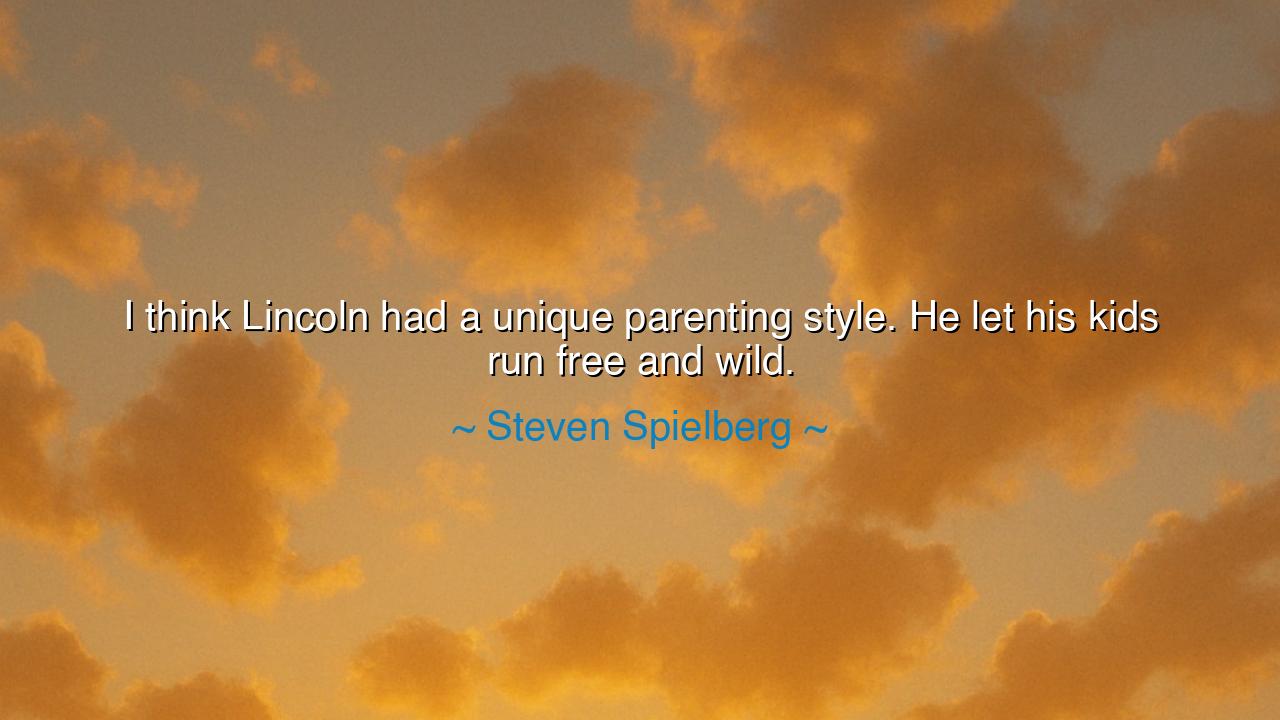
I think Lincoln had a unique parenting style. He let his kids






In the words of Steven Spielberg, spoken with reverence for one of history’s greatest figures: “I think Lincoln had a unique parenting style. He let his kids run free and wild.” These words remind us that greatness does not always emerge from strictness or rigid order, but often from freedom, patience, and the generosity of spirit. Abraham Lincoln, who bore the immense weight of a nation tearing itself apart, still chose to allow his children the liberty to explore, to laugh, and to grow without fear of constant restraint.
The ancients often praised the balance between discipline and freedom. The Greeks spoke of paideia, the cultivation of the whole soul, not by chains, but by guiding hands. The sages of the East, too, knew that the willow that bends in the wind survives the storm, while the rigid tree snaps. Lincoln, born of hardship and sorrow, understood that to love a child is not to crush their spirit with relentless demands, but to nurture the fire of curiosity, the joy of play, and the courage to be themselves.
Consider the accounts of those who lived in the White House during his presidency. Lincoln’s sons, Willie and Tad, were often seen racing through the halls, laughing loudly, or even interrupting meetings with dignitaries. Some in Washington sneered at this lack of formality, yet Lincoln never rebuked them harshly. Instead, he allowed them to remain children, even in the shadow of war. To him, their laughter was not an inconvenience, but a necessary music amid the sorrow of leadership. He knew that childhood is fleeting, and that freedom in youth lays the foundation for strength in manhood.
Spielberg’s observation captures this profound truth: Lincoln’s unique parenting style reflected his belief in liberty itself. Just as he longed for a nation where men and women could live free, so too did he create a home where his children could taste freedom without fear. This is no small matter—for a leader’s philosophy often flows first from his hearth. In the liberty of his sons, we see a mirror of the liberty he sought to extend to millions held in bondage.
The lesson for us is clear: to parent is not to dominate, but to guide. Rules have their place, but freedom has its fruits. A child who is allowed to “run free and wild” does not grow unruly when guided by love—they grow confident, imaginative, and unafraid of the world. Too much control breeds rebellion or timidity; too much neglect breeds despair. But freedom balanced with presence creates a spirit both bold and compassionate.
What, then, must we do? First, let us remember that our children are not clay to be pressed into identical molds, but seeds destined to grow in different forms. Give them space to play, to question, to stumble, and to rise. Second, let us not confuse indulgence with liberty. To allow freedom is not to abandon guidance, but to trust the child enough to test their wings while remaining near. Third, let us, like Lincoln, treasure the fleeting laughter of youth, knowing that tomorrow the burdens of life will come soon enough.
O parents, take this teaching to heart: greatness does not rest only in rules, but in the grace to let children breathe, run, and dream. Remember that even the man who bore the crushing sorrow of civil war found time to smile at the mischief of his sons. If Lincoln, with the weight of a divided nation on his shoulders, could grant his children the gift of freedom, then so too can we, in our smaller burdens, learn to do the same.
Thus, Spielberg’s words are not just about Lincoln—they are a reminder for all ages. Let children live. Let them run wild. Let them taste freedom under your watchful love. For in their laughter lies the seed of resilience, and in their freedom lies the promise of a brighter future.






AAdministratorAdministrator
Welcome, honored guests. Please leave a comment, we will respond soon